THE homeless crisis in the Territory is reaching new heights, with the number of people sleeping rough here 12 times the national average rate. With Homeless Week days away, we asked people to share their experiences of life on the street. NATASHA EMECK reports
Sitting under the shade of a towering banyan tree in Coconut Grove, the 75-year-old shifts in his scooter.
The disability pensioner can barely walk after he was hit by a car in New South Wales years ago.
The accident changed his life forever and left him with two fractures in his spine and paralysis.
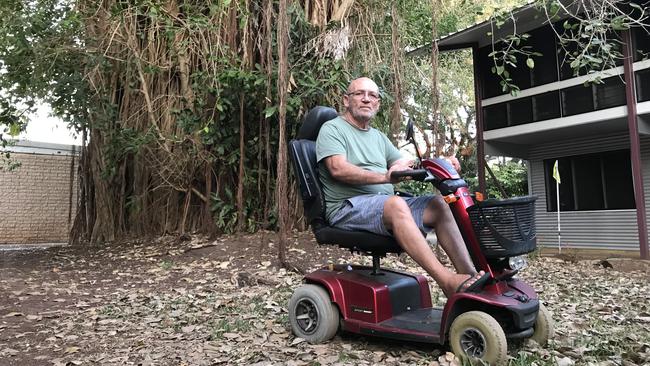
Carlos became homeless because he sent most of his pension to his impoverished family in Indonesia.
“I have children, a little boy Richie who is 7 and my daughter Katarina who is 5,” he says.
“I’ve been sleeping on the road to send money to them in Bali.
“As a disability pensioner I get about $280 a week, I send at least $200 to my family for their rent, food, electricity and gas because if I don’t my kids will be on the street instead.
“Some people here ask why don’t I just take care of myself but I would never be strong enough to turn my back on my family.
“I can’t help it. They are the number ones in my heart no matter what.
“I rather starve and sleep in a ditch than to have them do it.”
He dreams of one day being reunited with his family but right now the process of securing their visas is too expensive.
“I can’t barely afford food, how can I afford something like that,” he says.
Now living in St Vincent De Paul’s Bakhita Centre, which provides emergency accommodation for single men, Carlos brushes away tears as he talks about how happy he is to finally have a bed to sleep in.
“I nearly died a few times on the street, I had a heart attack and mild stroke,” he says.
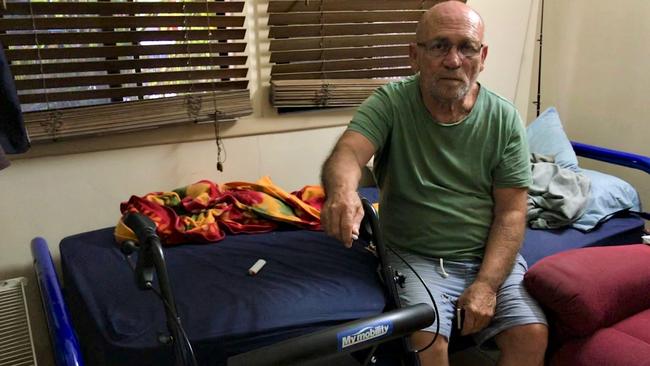
“I used to wander around the city near Mitchell St, with all my belongings in a Coles trolley and then at about 8-9pm I would start looking for a little place to sleep.
“Most nights I would go to park at the Waterfront but people would kick me in my head and leg and tell me to leave about three times a night.
“One night I even woke up to find someone pissing in my face.
“It was a humiliating but nothing compared to waking up one morning and realising someone had stolen my trolley. Everything I owned was gone just like that.
“I didn’t know what else I could do but just break down and cry.
“I remember looking up to the sky and asking God: ‘What are you doing to me?’”
That day was, without a doubt, the lowest point of his life.
“I wanted to go to a river filled with crocs and just jump in and let them take me,” he says. “I felt like things just kept going wrong and my mind couldn’t take it anymore.
“But the only thing that kept me alive was a voice in the back of my head, reminding me that if I killed myself, what would happen to my children?
“I cry just thinking about it.”
■ ■ ■
SYED Khan, 43, has been sleeping rough for about nine years now.
Originally from Myanmar, he came to Australia as a refugee after fleeing a violent conflict in his native country.
“I have post traumatic stress disorder because of the genocide that happened in my country,” he says.
“In 1987, my family was killed by air strike, when I was 11 years old.
“I had to see the burned bodies of my family in the rubble of the house when I came home from school.
“Everyone I loved was gone.
“I came to Australia in 2010 and ever since I’ve been here, I have struggled with homelessness and moving around.”
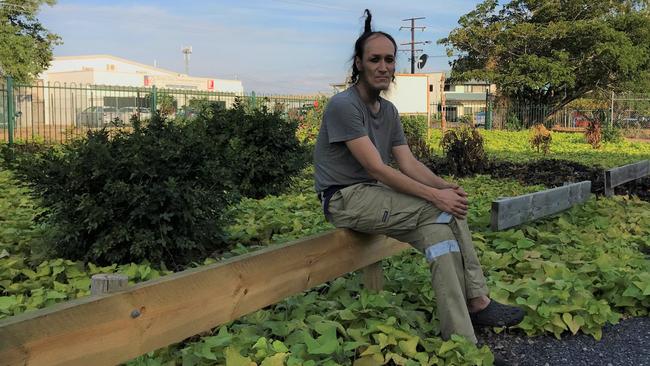
He says the Newstart Allowance he receives is not enough to pay for a place to stay, bus fares and food.
“It’s normal for me to not eat for days at a time,” he says.
“I mostly eat basic things like bread when I can but when I go shopping at Woolies and have to leave some things behind in a long queue, I feel very embarrassed.”
Before he came to Darwin this year, Syed says he would travel from town to town with nothing but his swag on his back and would sleep out in the bushlands.
“I slowly made my way from Broome to Kununurra before I came up here,” he says.
“When I needed to sleep I would go far away from people, out bush, where there’s a river nearby, someplace where there’s water and I can hide myself. So I feel safe.
“That was around the same time when a homeless woman got bashed with a brick at a shopping centre in Perth. A lot of people like me were on edge.”
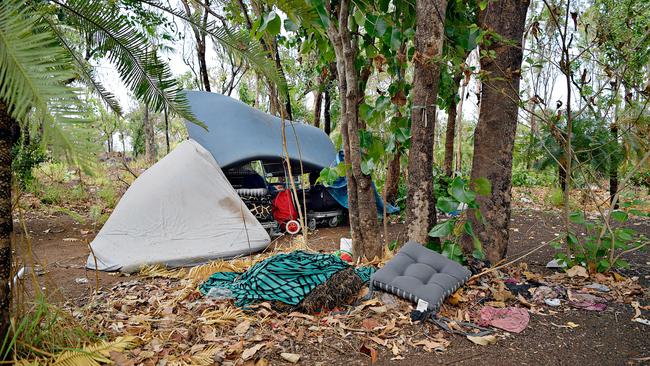
After finding a place in St Vincent De Paul’s Darwin emergency accommodation, Syed says he is finally able to go back to school.
He is due to complete a Certificate 3 in Conservation Land Management at Charles Darwin University by the end of the year, with the hopes of finding a job as a ranger.
“Before I got a spot at St Vincent I was over at Sunrise Centre for a little while — the spaces are very limited,” he says. “There are a lot of people struggling but not enough rooms.”
■ ■ ■
NT Shelter Executive Officer Peter McMillan says the Federal Government’s funding structure is not meeting the high demand of need in the Territory.
“Under the National Housing and Homelessness Agreement (NHHA) the Federal Government provides $1.4 billion to the states and territories to fund homelessness programs,” he says.
“The Northern Territory, which had a homeless population of 13,700 in the last census, receives about $19 million under the agreement — eight times less than the $157 million in funding Western Australia receives despite having a smaller homeless population of about 9000.
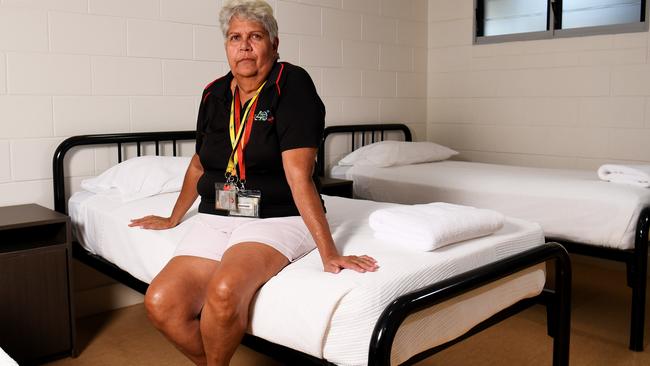
Mr McMillan says the federal funding is being distributed based on population and not need.
“It’s a completely illogical situation and it needs to changed,” he says.
A spokeswoman from the Federal Government’s Department of Social Services said the model they used to allocate homelessness funding under the NHHA recognised “the variation in levels of homelessness across jurisdictions”.
“The Productivity Commission will finalise a review of the NHHA by June 30, 2022,” she said.
“Outcomes of this review will inform funding arrangements post June 30, 2023.”
In a bid to address Darwin’s homelessness problem, the NT Government started a new trial in May to pay for 30 people sleeping rough in Darwin’s CBD to instead sleep in a suburban hostel as part of a new six-month trial.
OUR best value NT News subscription deal yet: $1 a week for the first 12 weeks
Galawu Hostel manager Daphne Allia says they have been almost completely full ever since the program started. “There’s a big unmet need for crisis beds in Darwin, so I think all these beds here will be full for the whole trial,” she says.

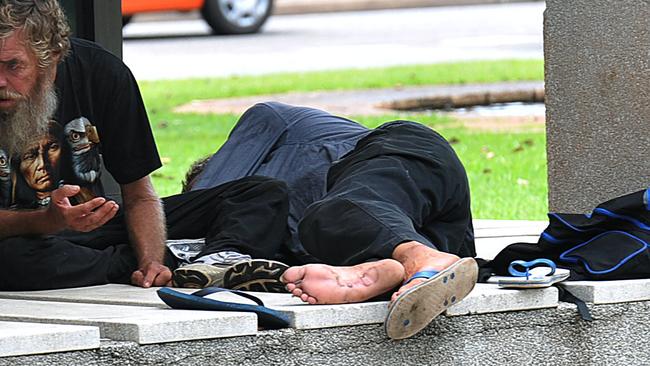
Add your comment to this story
To join the conversation, please log in. Don't have an account? Register
Join the conversation, you are commenting as Logout
Balibo Five: 50 years of grappling loss, finding kinship and fighting for answers
Fifty years after the brutal loss of his brother Tony, one of the Balibo Five, Paulie Stewart reflects on how his death not only shattered his world but also shaped the course of his life.
35+ PHOTO GALLERY: 2025 Victoria Variety Bash hits Darwin
It’s not every day you get to see Batman, The Joker, Bluey and a fleet of astronauts on the streets of Darwin – yet that’s exactly what Top End residents were treated to on Sunday. SEE THE PHOTOS